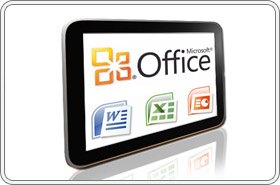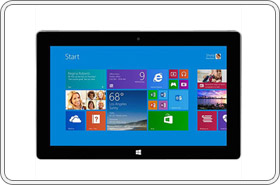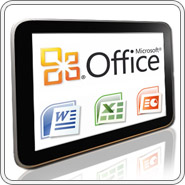Microsoft Office was recently released for the iPad, receiving glowing reviews![]() . However, the question still remains, are the apps the equal of their desktop counterparts? Or does the desktop still provide the best bang for your buck in a work environment?
. However, the question still remains, are the apps the equal of their desktop counterparts? Or does the desktop still provide the best bang for your buck in a work environment?
Office for iPad
 The office apps themselves are great, acting much like their Office 2013 counterparts for Windows. They cannot however replicate all of the features of desktop office. Office for iPad has had a few problems with formatting and there have been some reports of the apps closing down unexpectedly (though these did come from people testing pre-release versions of Office). Most notable for me though was the absence of keyboard shortcuts, something which I’ve grown increasingly dependent on for a fast workflow.
The office apps themselves are great, acting much like their Office 2013 counterparts for Windows. They cannot however replicate all of the features of desktop office. Office for iPad has had a few problems with formatting and there have been some reports of the apps closing down unexpectedly (though these did come from people testing pre-release versions of Office). Most notable for me though was the absence of keyboard shortcuts, something which I’ve grown increasingly dependent on for a fast workflow.
Perhaps the biggest frustration with Office for iPad in my eyes is the fact that documents have to be saved to OneDrive. This is Microsoft’s answer to Google Drive, Dropbox and other cloud services that let you work from multiple devices on the same file. However, due to the later implementation of OneDrive, most people are using other cloud services and may resent being made to use the Microsoft service.
These are however little niggles for what is overall a very impressive adaptation of a desktop product to the tablet format. In some ways, several of Office’s features seem to work better on tablet than they would on desktop, the resizing of images and quick selection of chunks of text being two good examples. There’s a lot to love about Office for the iPad, but I’m not sure there’s enough there to knock desktops off the top spot.
Better, but not the best
 There’s no doubt that Office for iPad is better than the Office for iPhone offered up last year. However, the iPad – and indeed tablets in general – are still playing catch-up with desktop. Whilst Office is an excellent adaptation of desktop software, tablets in general have yet to develop any killer apps or a push into new territory themselves. The apps tablets do have are capable; Keynote for iOS is a very powerful slideshow tool and many will prefer to use that, even though they have access to PowerPoint on the iPad. But as a whole tablet apps are rarely as powerful as their desktop counterparts.
There’s no doubt that Office for iPad is better than the Office for iPhone offered up last year. However, the iPad – and indeed tablets in general – are still playing catch-up with desktop. Whilst Office is an excellent adaptation of desktop software, tablets in general have yet to develop any killer apps or a push into new territory themselves. The apps tablets do have are capable; Keynote for iOS is a very powerful slideshow tool and many will prefer to use that, even though they have access to PowerPoint on the iPad. But as a whole tablet apps are rarely as powerful as their desktop counterparts.
Tablets also have the disadvantage of not being great when composing long documents. Tapping onto a touchscreen is all right for short bursts, but if you have to write a longer document or input a lot of information you soon find yourself longing for a keyboard. Whilst you can purchase keyboards for the iPad, this is an added cost that you may not want to pay, and also reduces some of the portability that a tablet offers in place of a laptop.
Not Universally Popular
 A lot of IT departments aren’t ready for mobile yet. There are plenty of companies who argue that mobile devices in the office are a fad and, whilst the BYOD movement has a strong following, it will peter out. Whether they’re right or not remains to be seen, but as long as IT departments in big companies aren’t willing to put themselves fully behind a mobile push, tablets will struggle to cement themselves as the primary device in offices.
A lot of IT departments aren’t ready for mobile yet. There are plenty of companies who argue that mobile devices in the office are a fad and, whilst the BYOD movement has a strong following, it will peter out. Whether they’re right or not remains to be seen, but as long as IT departments in big companies aren’t willing to put themselves fully behind a mobile push, tablets will struggle to cement themselves as the primary device in offices.
Furthermore, businesses seem unwilling to be the first to dip their toes into serious app development, and that too is slowing down the uptake of tablets in the office environment. Until more businesses are willing to do exactly that, there won’t be enough serious enterprise apps to put a tablet at every workstation.
Hidden Costs
As well as these issues with tablets when contrasted with desktops, it’s also important to consider some of the costs that are not immediately obvious at first glance. Firstly, if you want to use Office for iPad, you’ll need to pay. Whilst the apps themselves are free, to use them you need to have a subscription to Office 365. If you’re a business owner not currently using 365, the cost of licensing your business may be quite significant.
Beyond that, there is the technical reality of maintaining a tablet-based office. When your business operates on desktops, these can be upgraded and kept at a decent spec over time by your IT department. However, when your tablets fall out of spec you will have to replace them completely, as there’s currently no way to upgrade tablets. This is a serious hidden cost that could put off a lot of businesses that might otherwise be tempted by a tabled-based workspace.
Don’t Throw Out Your Desktops Yet.
While Microsoft’s obviously well thought out addition to the iPad shows that tablets are getting more attention as a viable work device, there are still too many weaknesses for them to replace the desktop computer.
More viable perhaps is their potential to replace the laptop as a mobile work device, as they have already proved themselves strong competitors in that respect, especially when it comes to portability and battery life. The argument is far from over however, and the BYOD devotees are sure to continue exploring the potential of tablets both in and out of the office.


